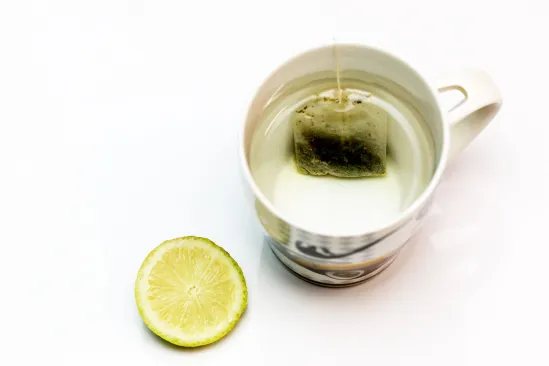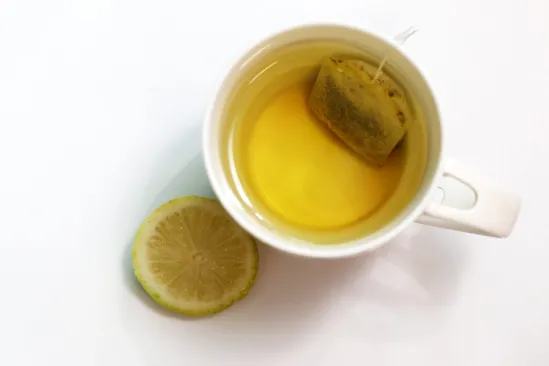Contents
Focus on the benefits of green tea
Step 1: Prepare your green tea correctly
Step 2: Drink the right amount of green tea
Green tea is rich in fluorine, amino acids, provitamin A, vitamins B, C and E, and especially in precious antioxidant polyphenols (mainly catechins, theaflavins and thearubigins). These different substances, in particular the polyphenols, are at the origin of green tea’s numerous preventive and curative properties.
This practical sheet explains how to take advantage of the health benefits of green tea.
Zoom on the virtues of green tea
Antioxidant properties of green tea
Green tea has amply demonstrated, through scientific studies, its various preventive virtues, linked mainly to its polyphenols with powerful antioxidant properties, which protect our body against free radicals.
Green tea contains more antioxidants and beneficial compounds than black tea, although black tea is also effective in lowering systolic blood pressure.
Cardiovascular benefits of green tea

Green tea has been shown to its:
- ability to lower blood cholesterol;
- preventive and curative action against atherosclerosis;
- effectiveness against high blood pressure;
- and finally, its preventive action against heart attack and stroke.
Polyphenols facilitate blood circulation and promote the health of cells and blood vessel walls.
Anti-cancer properties of green tea
Scientific studies show that green tea effectively prevents certain cancers, particularly blood, breast, prostate, lung, colon and skin cancers.
Other benefits of green tea
Recent studies tend to show that green tea would have a preventive effect:
- neurodegenerative diseases (Alzheimer’s disease and related disorders, Parkinson’s disease);
- cataracts, AMD (age-related macular degeneration) and diabetic retinopathy;
- caries and oral diseases (when it contains 1% tannin, green tea, used as a mouthwash, helps fight against gingival inflammation and the formation of dental plaque).
Moreover, like all antioxidants, green tea can delay cellular aging, thus delaying the aging of the skin and the entire body.
The ailments that can be treated with green tea
In addition to its role in preventing certain diseases, green tea can be used curatively in the following cases:
- stress (relaxing virtues of the theanine in green tea, which increases the production of alpha rhythm in the brain);
- slimming (draining properties of green tea), winter ailments (immunostimulant, antibacterial, antiviral and anti-inflammatory action of green tea);
- diarrhea (antimicrobial effect of green tea, high mineral content compensating for losses due to dehydration);
- bad breath (antimicrobial effect of green tea);
- gingivitis (antibacterial and anti-inflammatory action);
- hangover (green tea helps eliminate alcohol from the body).
1. Prepare your green tea correctly

To get the maximum benefit from green tea, make sure you prepare it properly:
Use 5 grams of green tea leaves (1 teaspoon) per cup.
Use as many cups of water as you need to brew your tea + the amount required to heat the pot.
Bring water to about 80°C, or bring it to a boil and let it stand for 2 minutes.
Pour water into the teapot to heat it, then discard the water.
Place the tea leaves or tea bag in the teapot and pour the remaining hot water over them.
General case: let it brew without stirring for 3 to 5 minutes (beyond that time, the tea will be bitter).
Special case: if you use green tea to treat diarrhea, let it steep for 10 minutes.
Good to know: it is recommended to use loose tea packaged in paper bags because a Canadian study shows that plastic tea bags release nearly 11.6 billion particles of micro-plastics and 3.1 billion nano-plastics (in the end, it is 13 to 16 micrograms of plastic that end up in the water of a single cup of tea).
2. Drink the right amount of green tea
For preventive action, drink at least 1 to 2 cups of green tea daily and up to 5 cups daily.
For curative treatment, drink 3 to 4 cups of green tea daily for the duration of the symptoms.
To relieve gum problems, make a mouthwash with 15 ml of tea for 1 minute twice daily.
Note: green tea is less concentrated than black tea in caffeine and is unlikely to cause sleep disturbances.
If you are on anticoagulant treatment, avoid consuming too much green tea because it contains small amounts of vitamin K: it is better to ask your doctor for advice.
Preferably, drink green tea outside of meals for better assimilation.
Note: avoid adding milk, which could counteract some green tea.


